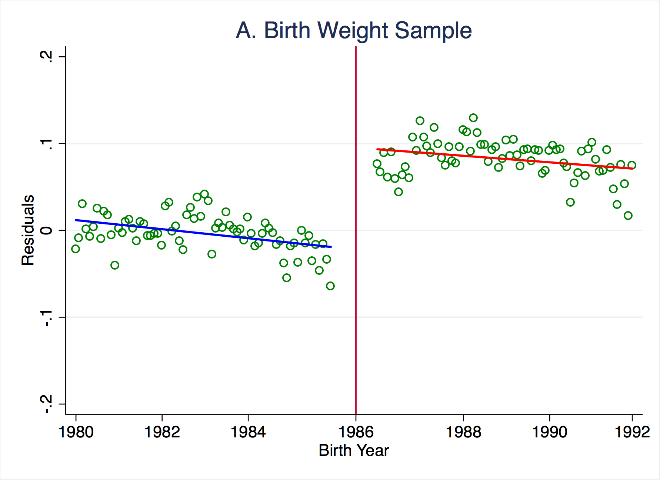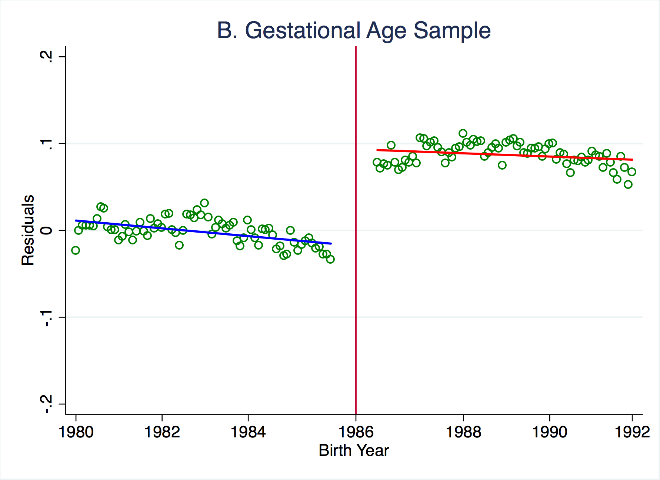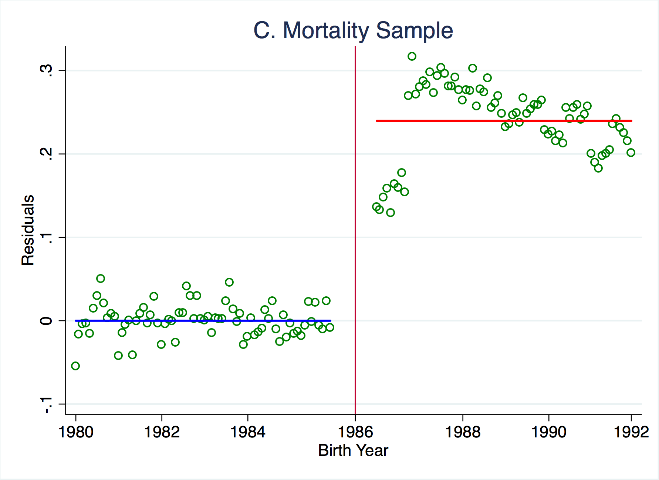
The impact of extending female compulsory education on child health in Turkey
Turkey’s education system reform in 1997 required females to extend their minimum years of schooling from five to eight years. Results document that the children of women who were impacted by the reform are healthier at birth and less likely to die prematurely.
Increasing female educational attainment in developing societies has been advocated by many for different reasons, including promoting child health. Yet, the state of the literature on the causal relationship between maternal compulsory schooling and child well-being in developing countries is limited. To fill the void in the literature, we examine the impact of mother’s extended primary schooling on birth outcomes and child mortality using two large data sets from the Republic of Turkey.
The study
We use the 1997 education system reform in Turkey, which extended the duration of mandatory schooling from five to eight years, to address the endogeneity of maternal education to children’s outcomes. This allows us to use a natural experiment to address issues such as the unobserved propensity of mothers who seek additional schooling to be more likely to invest in their children’s health.
A unique feature of the schooling reform of 1997 is that, in a developing country, it arguably provides one of the most suitable empirical frameworks to identify the local average treatment effect of compulsory education among women with a low tendency to extend their schooling beyond five years of elementary school.
Education in Turkey
Until the mid-1990s, the Turkish primary and secondary education system was comprised of three stages: elementary school (5 years), junior high school (3 years), and high school (3 years). Of these, completing the first stage was compulsory, and whether a child continues schooling after earning an elementary school diploma was left to the discretion of families. Non-compliance was subject to monetary fines, even though they were not always strictly imposed. With the exception of books, supplies, school uniforms, and commuting costs, all public primary and secondary schools were free of charge in Turkey.
Education system reform
In 1997, the Turkish Parliament increased the duration of compulsory schooling from five to eight years. The reform became effective in the 1998-99 academic year, combining the first two stages of schooling (i.e., elementary and lower secondary) under the umbrella of Primary School (İlköğretim Okulu).
The new legislation meant that children who completed fifth grade in 1998 were obliged to continue their education until they earned a middle school degree. In other words, those who started elementary school in the 1993-94 academic year were the first cohort to be impacted by the law. Because the Turkish law allows pupils who are 72 months old by the end of the calendar year to begin elementary schooling in the corresponding academic year, children who were born in 1987 constitute the first fully affected birth cohort. Figure 1 shows the jump in schooling as a result of the reform, using the various samples that we employ in our study.
Figure 1: The impact of Turkey’s 1997 reform on educational attainment



The data
Importantly, the reform mainly focused on increasing educational attainment and made no curricular or compositional changes. Therefore, our identification strategy relies on the following assumption: Once the trends at the birth cohort level are accounted for, those born before 1986 should constitute an ideal comparison group for individuals who were born after 1986. This type of an instrumental variable is consistent with the fuzzy regression discontinuity design.
We use two data sets in our analysis: Birth outcomes data from the Turkish Ministry of Health, and child mortality data from the Turkish Statistical Institute’s Population and Housing Census 2011. Child health outcomes analysed include very low birth weight (< 1500 grams), low birth weight (< 2500 grams), and high birth weight (> 4500 grams); child mortality (deceased before age five); gestation; and premature birth (gestation < 37 weeks). In addition, maternal outcomes analysed include the method of birth delivery and propensity to smoke.
Findings
Results indicate that mothers who completed at least eight years of schooling are less likely to deliver babies with very low birth weight, low birth weight, and high birth weight, and they are less likely to have a child deceased before age five. Furthermore, obtaining at least a middle school degree extends gestational age and lowers the propensity of delivering premature babies. Lastly, we also find evidence suggesting that additional education, through exposure to the reform, increases the likelihood of a vaginal delivery and lowers maternal smoking. We perform a number of robustness checks to test the sensitivity of our baseline estimates.
To put the estimates in context and be able to compare to other studies examining the relationship between maternal education and child health in developing countries, we calculated the impact of at least one additional year of maternal education, which is obtained by dividing our estimates by three, given that the 1997 education system reform led to an increase of at least three years of education among those who are impacted by the law. Our results imply that at least one more year of maternal education:
- lowers the probability of very low birth weight by 0.53 percentage points, low birth weight by 0.83 percentage points, and high birth weight by 0.3 percentage points;
- lowers the probability of premature birth by 0.6 percentage points;
- lowers the probability of child mortality by 0.6 percentage points;
- increases the probability of a normal birth by 3.3 percentage points; and
- lowers the probability of maternal smoking by 1.33 percentage points.
Our careful analysis addresses potential concerns surrounding the validity of our instrumental variable. The 1997 education system reform in Turkey is a unique one in developing countries because it allows one to estimate the policy implications of compulsory schooling at the lower end of the educational attainment distribution.
While the efforts towards accomplishing universal primary schooling in poorer societies of the world lead to significant progress, many developing countries have relatively few years of mandated education. Furthermore, those with compulsory schooling laws oftentimes fail to successfully enforce the rule, especially for females. Taken together, our findings underscore the role of positive health spill-overs of women’s education in developing countries, where rates of female educational attainment are significantly lower.
Conclusion
This research provides strong support for the argument that enacting compulsory schooling laws and enforcing them in developing countries may have large positive externalities in terms of child health.
References
Dursun, B., Cesur, R. and Kelly, I R (2017). The Value of Mandating Maternal Education in a Developing Country. National Bureau of Economic Research (NBER) Working Paper No. 23492.

